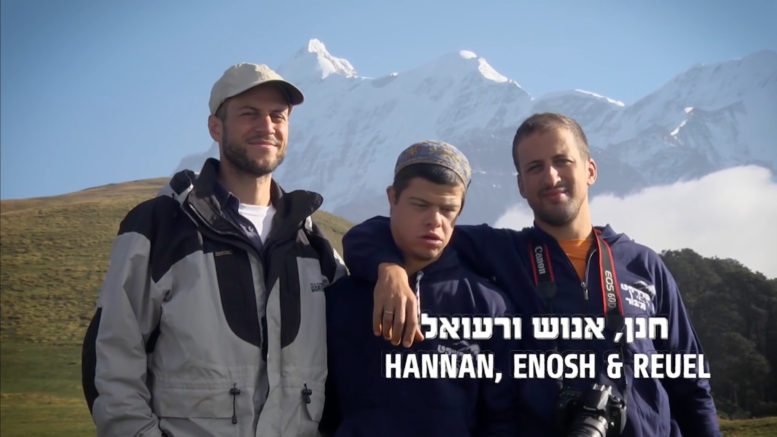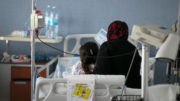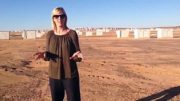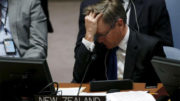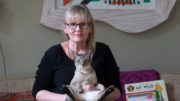Israeli director Yonatan Nir’s film, My Hero Brother, was recently screened in Auckland at the Doc Edge festival, winning Nir the festival’s Best International Director title. Due to popular demand an additional screening will be held in Auckland on Monday 5 June 2017.
My Hero Brother follows a group of young Israeli adults with Down syndrome as they set out an arduous mountain-climbing trek in the Himalayas, each accompanied by their brother or sister. The journey, with its dramatic ups and downs, tests – and in many cases strengthens – these sibling relationships. Touching and poignant, the film reveals insights into the complexities, challenges and rewards that can be part of relationships where one sibling has special needs.
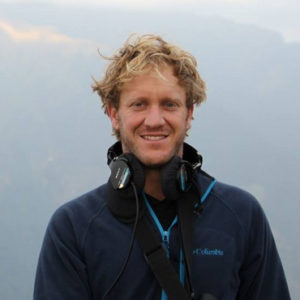 I was fortunate to have some time to speak with Yonatan Nir during his short visit to Auckland during the festival and asked him a few questions about the film, his background and Israel.
I was fortunate to have some time to speak with Yonatan Nir during his short visit to Auckland during the festival and asked him a few questions about the film, his background and Israel.
SM: I saw the film last night. I was laughing and crying at the same time. How many times did you cry making this film?
YN: I probably cried a few times, and it’s like you are sitting behind a camera and asking questions and you feel like emotions coming up – it’s not crying from a sad place, it’s just the emotions – it’s what people with Down syndrome do to you, they have this direct route to the heart. Because they don’t bring everything through the filters of the brain and the mind, you start to become like them in a way. So I remember a few times that I was sitting behind the camera and crying and laughing at the same time.
SM: What struck me was that interactions were very natural throughout the film – there seemed to be little awareness of the camera. Was that easy to achieve?
YN: You can see at some point that they were aware; they were speaking to the camera, you know the part where Hannan [a young man with Down syndrome] is telling me, “clap your hands”. He’s aware of the camera. They’re very uncomplicated in the way they judge life. When you work with famous people, they have a public persona; they’re always aware of what they say and then it becomes not natural. For them [the siblings with Down syndrome] it was very very natural.
They accepted me as part of the group, and I also work with small cameras, I don’t work with huge cameras. I sometimes shoot from here [chest height] and I work with very small crews.
I also know that if I miss a scene I cannot ask them to do it again because they will not do it. I need to be ready all of the time, me and my cameramen, and shoot whatever you can catch.
We had like 60 hours [of footage]. It took almost two years to edit it – because it’s a lot of work. How you weave the different stories together, which one you leave outside, which one you leave inside. With all these protagonists you have to construct one story – and in the end I hope you get the idea of what is it to live close to somebody with Down syndrome, with the positive things and negative, hard things, and with the beautiful things it brings with it and also not to get into stereotypes.
SM: You had 11 pairs of siblings on the journey, and you focussed in on five. Was it difficult to whittle it down?
YN: What’s interesting in documentaries is the process, is change. It’s not interesting if you start at one point and end at the same point without having to go through a journey. What I try to find is those pairs with unresolved issues, and which I feel can go through a process.
SM: Can you tell me a little about how this film came about?
It started in 2011. Enosh [Cassel, co-producer], who was travelling the world like many other Israelis, thought to himself that it would be really great if Hannan, his brother, could have the same experience as we all can have, you know, seeing the world, travelling the world, meeting new people – something that is very relatively easy for us but impossible for them.
So he took him on a one-on-one adventure in Nepal. This was the spark that started the whole thing, because when he came back he brought a camera with him and he made some footage and they used it in a news report in the Israeli news. And I watched it and I was really touched by it.
I was not the only one to watch it. Many other people with brothers or sisters with Down syndrome watched it too. A day later Enosh started to receive phone calls from people who he didn’t know but who said, “we have the same story like you and we want to do the same thing with our brother or sister, how did you do it?”
Then he contacted Itamar Peleg [a co-producer] who is a tour operator – they’re friends. He told him, “listen, I’ve got all these phone calls from these people – what is the chance that they can do the same thing?” And Itamar said, “I can do it”. So then together they founded this group; they called it My Hero Brother. They started to meet each other in Israel and managed to raise the funds for it – it took them a year and a half.
Somebody called me and said, “Hey there is this group of people with brothers/sisters with Down syndrome, maybe you should make a film about it”. I had just finished a film that was very successful, called Dolphin Boy. And I said, “Wait a sec, I saw something about that two years ago”. And he said, “yeah it’s the same guy, and now they’re looking for a director”. I went to see them, there was a click and then a few months later I was on a plane with them.
SM: Why climbing mountains? When you watch the film, it looks difficult for me, and I know, having a brother with Down syndrome, how physically challenging it is, even trying to walk quickly across the road. They often have difficulty with a lot of walking. So why such a difficult journey?
YN: I think we grow only when we get outside our comfort zone. And that’s why I think we climb mountains, why we travel, why we do sports.
Now the question is what do you do with a person who cannot make that decision, and you bring him to this situation? Where is the fine line between responsibility and control of someone else’s life? That’s the difficult question, and that’s a question that’s part of the daily life of someone with special needs or Down syndrome.
It’s like Harel [a young man with Down syndrome who found the parts of the trek particularly difficult both physically and emotionally]. If I would ask him, “do you want to fly out of Israel to India”, he would probably say no. If I asked him, “what do you want to do tomorrow”, he would probably say, “I want to watch TV and eat Doritos and just lie there all day and that’s it”. And we don’t let him lie there all day because we believe that he needs activity, needs to be with people, and we also want him to grow. He will grow only if he does things that are out of his comfort zone. This question of how far do we take it, it’s a daily question for [families of people with Down syndrome].
SM: That was much of the drama of the film – you could see there were moments where siblings felt terrible for bringing their brother or sister on this journey, so many moments where they must have felt, “what have I done?” And even the organisers –you could see the thoughts going through their heads of, “have we done too much?”
YN: I want to tell you a story about that. At one screening in Israel a woman stood up and said, “Your film is really nice, but I think you really pushed it too much and I think they really suffered too much. And I think it was a bad decision to make this journey and this film”. And I said, “You know what, I completely understand this position and the reason why you even had these thoughts is because I decided out of the 60 hours that I shot, to leave enough tough moments that you will feel this way. Because I felt this way too sometimes along the trip. So the reason why you say it is because I wanted you to feel it”.
And then in the audience was the mother of Nitzan [a young woman with Down syndrome who participated in the journey]. She [took to the stage] and said, “I want to tell you a story. A few years ago I went to the Himalayas with my husband and we travelled and it was extremely hard for me and I was angry with myself for agreeing to come to this trip. I felt bad, I suffered. Even when I got to the summit I felt like it wasn’t worth it. And then I came back to Israel and a few months later I started to feel really good about this trip, started to remember how I dealt with this fear, with this pain and this hardship, and I felt better about myself for being able to deal with it.
“The same exact thing happened to the people with Down syndrome. Ever since Nitzan and Sagi [Nitza’s husband] came back from the Himalayas their relationship is much stronger. Last year they went to Poland together on a trip. Who would believe that they could do that? I would never have allowed them to do that and now they went there, because they did what they did in India and they have this memory of succeeding to deal with a very tough thing together, something that made a stronger bond between them. Next year they want to go to the States together – it’s amazing.” The same thing happened to each and every one on the trip.
SM: You’ve spoken before about your upbringing on a Kibbutz. How do you think it shaped who you are, and led to the direction you’ve taken?
YN: It’s hard to say what led to what. I grew up on a Kibbutz, my parents divorced when I was really young, so I grew up a lot with my grandparents, and at that time on the Kibbutz we were really independent. So I remember when I was 7 or 8 years old, riding bicycles, looking for birds… The circumstances of my life really made me love nature, adventures.
I grew up with classmates who are like brothers and sisters because you go to sleep every night in a house with them – in the “house of children” as we used to call it. For some people it was very tough – but for me it was very good because my parents had divorced and I didn’t feel the divorce that much because I was with the other children all the time.
And then afterwards I went into the military service – I spent three and half years almost in special forces commando unit, and dealt with really complicated, dangerous situations. Then I went travelling and was travelling for seven years around the globe…I worked as a diving instructor in Thailand, Honduras and in Hawaii, I had business in the United States, I was married in the US and divorced and then I started working as a photojournalist in different places around the world. Then I studied film-making, I met my wife and we have three children today.
I’ve been through some really tough times and I lost many friends through the military service, and it all shaped my personality. We cannot really choose what happens to us in our lives, but we can choose how we react to it and what do we do with the cards in our hands. So in all my films the protagonists are the people that didn’t get the best cards in their hands, but they play the game and they try and they lose and they win. The fact they are trying, that’s what’s important to me. The fact that someone is engaging in life, in the process of living this life, not just letting life go by, complaining about what’s happening to me, but trying to do better all the time.
Me: What’s it been like touring as an Israeli at these film festivals? What sort of reception have you had and do you think the film has changed people’s perceptions of Israelis?
YN: You know if I had made the film to change people’s perceptions of Israel it would not be good. So I’m not doing it in order to change perception, but I do care about the perception of Israel in the world. I think in a few places it’s not fair. I think that – each and every one of us, when we look at another place, we don’t really understand what’s going on over there. And we don’t – until we go there, meet people, we get to know them, share ideas.
So when I go to film festivals – and it was the same with Dolphin Boy – [my film] shows the positive part of not only Israel but mankind. That’s what I try to do. And we do have very good people in Israel, as we do in Syria, as we do in Jordan, as we do in Egypt, and Palestine. There are so many negative stories in the media because fear sells better than love and hope, unfortunately.
And what happens when you see the negative stories is you absorb it and it makes the negative part of you stronger and the positive part of you weaker because they don’t see any inspiration, any role models. So I’m trying to bring positive role models into my films. I’m trying to take regular people who are going through some struggles, pain, hardships, and show how they are dealing with the situation, trying to become better human beings. Sometimes they succeed, sometimes they don’t, but they strive. And I hope when someone watches my film, it will give him or her inspiration to give more power to the positive parts that we have inside ourselves.
Interviewer: Shoshana Maasland
